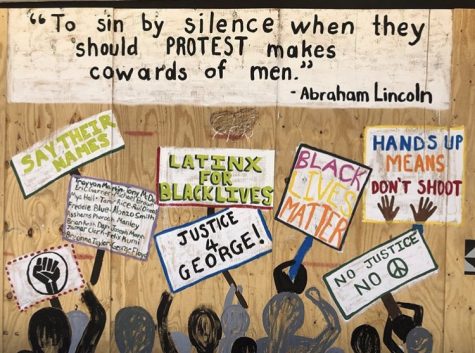Black Lives Matter and our community: discussing impact
October 23, 2020
With the recent events of George Floyd’s death in the summer, there has been increased controversy internationally on the Black Lives Matter movement and the discussion of racism in the United States. From peaceful protests to riots, the tension between supporters and non-supporters is high and climbing.
Senior Ari Williams feels there’s been a lot of misconceptions about the BLM movement with people associating it with violence in the past several months: “I wish people would understand that the small percentage of violence that has resulted from the looting doesn’t speak for the entire movement. It’s a movement for change and equality, not violence,” WIlliams said.
Senior Nick Schmidt-Bailey agrees to this, “Unfortunately, a lot of my white peers and even my parents tend to associate the movement with violence,” Schmidt-Bailey said.
Dean Sheldon Davis speaks on this as well.
“I have to question what it is people want black folks to do exactly? We try peaceful protests, sit-ins, [and] marches over the years; at some point, people have the mind set that it takes some type of physical action in order to get people’s attention and create change. As far as the violence–I don’t condone it or think it was right, but having participated in a couple protests myself… there are people who infiltrated the protests who didn’t want to really be a part of it, but wanted to see anarchy and destruction,” Davis said.
Not only are there instances of racism in the media, they lie within DGS and the community. Davis and counselor Lavon Robinson share their experiences on microaggressions they’ve experienced in the workplace.
“As far as the school setting, I think sometimes there’s an assumption made that you got your job because there’s some type of quota… that you only got your particular job because of your race or color. For me, when I first got here in 2006 there was a little of that and I was a bit younger and it was more ‘Oh, did he get his job because he’s black?’ [When in reality] I got it because I was qualified and the best candidate for the position,” Davis said.
Robinson continues: “In the workplace I haven’t experienced anything overtly–I have had people make jokes that are insensitive. [Also,] maybe because I’m younger or it’s the color of my skin, but it’s often that people ask me where I’m going, to see my badge, times where I’m coming in the school late at night people will ask me where I’m going. This has been well past my first year of people asking me to see my ID and things like that,” Robinson said.
Williams has experienced similar instances as well, “I’m lucky enough to say I’ve never experienced obvious or intentional racism, but I do frequently have teachers mistake my name for the only other black girl in my class often,” Williams said.
WIth students and staff at DGS having their own experiences of racism comes the demand for solution and equality. On Monday’s, members of the DGS staff watch videos on diversity training, equality and inclusion.
“We talk about different situations to try to train our staff to better interact with each other and students. We try to make sure we educate each other, that’s the only way you’re going to move things forward,” Davis said.
Although DGS provides the books on history and gives training to staff members, Williams feels there needs to be more discussion among students on the harmful effects of racism.
“I feel like a deeper discussion on why the n-word is harmful to anyone who is not black to say is needed greatly at DGS. People have all the means to know why that word is harmful but choose to ignore it. Discussions on it as early as freshman year make these truths harder to ignore,” WIlliams said.
Schmidt-Bailey also feels there needs to be more discussions on topics like racism.
“I feel DGS does an above average job at teaching their students about racism; however, instead of giving students the option to take classes like Multicultural Studies, I feel it should be a requirement to take a class about topics like racism. Too many students leave DGS with prejudices… having a class where we learn from an unbiased source on the importance of social justice should not be an option,” Schmidt-Bailey said.
Robinson feels that a good place for people to start understanding BLM is by having conversations where peers listen to black voices.
“I think sometimes in the Downers Grove community, with its lack of diversity, it’s difficult for people to learn about things they never heard about or things they haven’t seen before, so with the BLM movement people rightfully are quick to have an opinion. But as a black person, I would prefer for people to just listen and try to understand, even though something isn’t your experience, this is the experience for a lot of people in our country,” Robinson said.
Anyone who is harmed by an act of racism or feels they need to have a conversation with someone should contact a trusted adult or the DGS Counseling Services.
